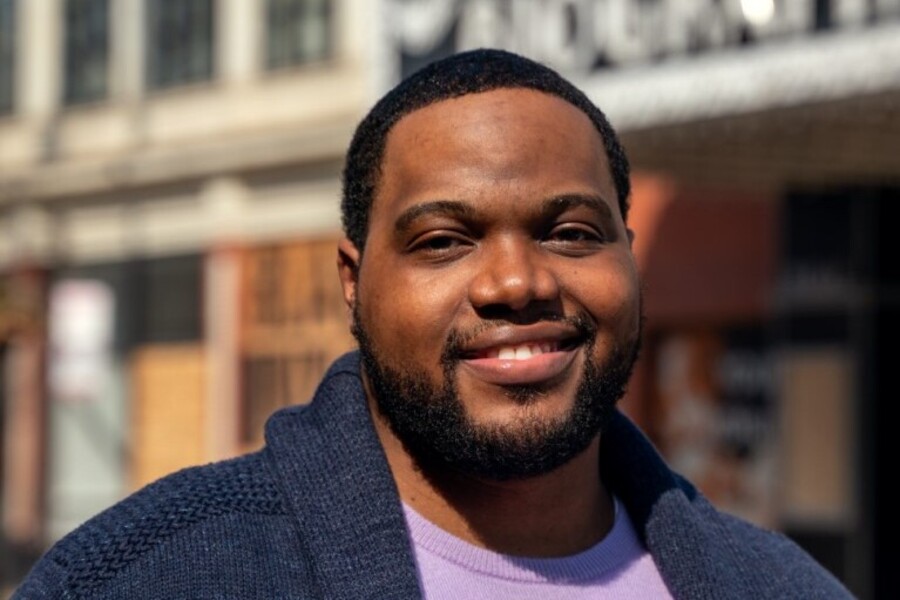CHICAGO: Victory Gardens Theater (VG) has announced that Ken-Matt Martin (he/him) will join the company as its new artistic director beginning on April 19. Martin, who had been serving as associate producer at Chicago’s Goodman Theatre, becomes the theatre’s third artistic director in its 46-year history. Martin will take the reins of the company alongside interim managing director Roxanna Conner and new board president Charles E. Harris II.
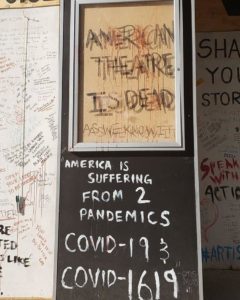
Martin joins after a summer of unrest around the theatre’s handling of former artistic director Chay Yew’s departure and subsequent restructuring to appoint Erica Daniels as the theatre’s executive artistic director, as well as its response to the local Black Lives Matter marches, which left the company’s famed Biograph Theater boarded up and covered in calls to “Wake Up, VG.” The theatre community called loudly for a more open and transparent search for the company’s next artistic leader—a call that prompted the departure of the entirety of the theatre’s playwrights ensemble. Last fall, the company partnered with Arts Consulting Group to do just that. The result was a six-month hiring process that included multiple rounds of interviews and chances for both VG’s staff and community to meet with and ask questions of the prospective new leaders.
In a recent interview, Martin said he saw that these calls from VG’s community were working, so it felt like the right time to toss his hat in the ring. Before joining VG, Martin co-founded Pyramid Theatre Company in Des Moines, Iowa, where he served as executive director until 2018. He was then named producing director of Williamstown Theatre Festival before joining the Goodman in the fall of 2019. Since moving to Chicago, Martin has joined the board of Season of Concern, a charitable organization focused on aiding theatre artists, and he also serves as a consultant and anti-racism facilitator for New York City Center, Design Action, and Arkansas Repertory Theatre. Originally from Little Rock, Ark., Martin has received theatrical training from Arkansas Repertory Theatre, Drake University, and Brown University/Trinity Rep, where he received his MFA in directing.
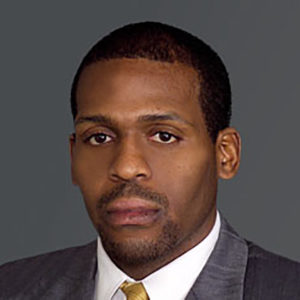
“We are excited to welcome our new artistic leader, and the vision he brings to Victory Gardens,” said Harris, president of the VG board, in a statement. “We are confident that Ken-Matt will continue the theatre’s traditions of new-play development and programming that spark conversation and social change, and look forward to deepening our core values of diversity, innovation, excellence, and accessibility under his leadership. While there are numerous challenges to overcome as we return to live production in a post-pandemic world, I am confident that Victory Gardens will thrive under Ken-Matt’s direction, and will return better than ever.”
As the company enters into a new leadership phase, Martin and Harris hope to bring a combination of a wealth of experience and fresh eyes as the theatre, now led by three Black leaders, works to deepen its commitment to its mission. While a final decision has not been made about the “interim” status of the theatre’s third leader, both Martin and Harris emphasized how crucial and outstanding Conner’s work and contributions to the theatre have been over the last few months, especially her spearheading the theatre’s efforts around the We See You, White American Theatre demands. Harris hopes to gauge where Conner’s own interests lie, but also says he and the VG board have learned through this process the importance of being transparent in their hiring search for a permanent managing or executive director. Conner is currently still carrying the title of director of education and human resources, in addition to becoming VG’s interim managing director. Martin added that he’s looking forward to finding the best fit for her within the organization and setting her up for success.
As outstanding questions go, none might be larger than the future of the theatre’s playwrights ensemble. For now, that’s still an aspect is coming into focus as Martin continues his conversations with VG’s employees and artistic community.
“I personally have no interest in changing that,” said Martin. “I think it will be imperative to figure out how we honor those who have come to that ensemble in the past. Hopefully this feels like an artistic home of sorts for them, in whatever way that might mean. Looking toward the future, I’m excited to figure out what new playwrights we want to include in that category as well.”
As Martin prepares to take the reins, I had a chance to chat with him and Harris yesterday about their vision for the company moving forward and their perspective on the adjusted hiring process.
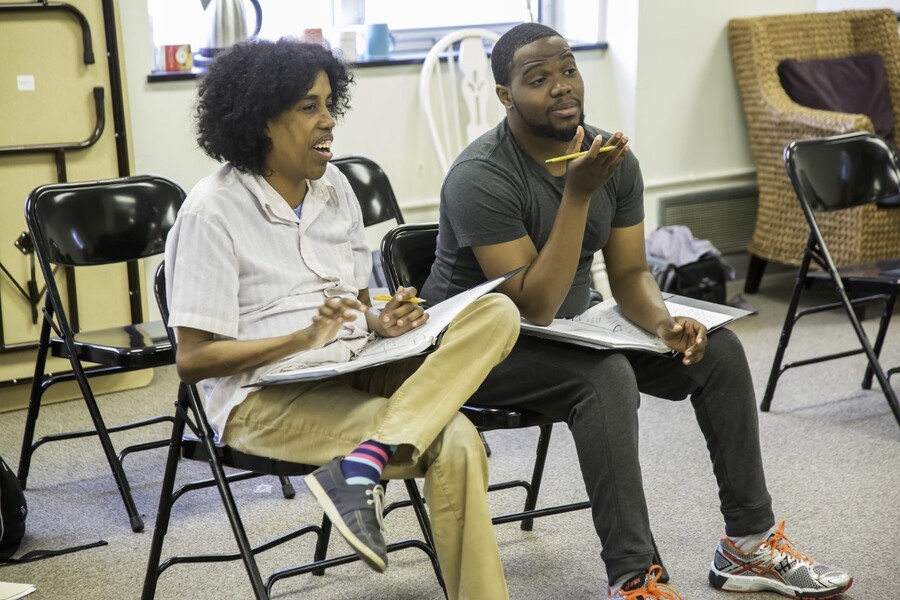
JERALD RAYMOND PIERCE: I remember the last time we talked, you mentioned that running a theatre wasn’t necessarily your trajectory anymore, and you mentioned a future goal of heading back down South to create theatre. Can you tell me a little bit about what changed and where you are mentally now?
KEN-MATT MARTIN: I looked at this as an opportunity to say, “Okay, what is the mission of this theatre?” I really sat with the mission, and what really struck me and has stuck with me was that the theatre, within its literal mission, talks about inspiring meaningful civic change. It talks about what it means to be a catalyst for social change, which has been my personal mission statement for years. So it was one of those things where I was like, “All right, I’m going to apply for this because its mission makes sense to me.”
This institution, right now, this mission, this board—this is a clean slate, and an opportunity to really advance work that is asking us to think about what is equity, what is justice. That’s the key of what is VG’s mission, on top of the fact that they just do really exciting new plays and innovative work, which is also something I’m really interested in.
So I think that’s what changed. If I’m being honest, that was the mindset shift. I’m still waiting for the other shoe to drop, frankly, because it still feels a little too good to be true. While I expect it to be a lot of work, to be clear, how perfect a scenario it feels like for me to be moving into this institution at this moment, at this time. That is something really unique.
PIERCE: I’m glad you brought that mission up. It makes perfect sense and seems like an ideal situation for you, based on the conversations we’ve had before. Thinking about your history with and passion for the South, I’m curious if you are still dedicated to that emphasis?
MARTIN: You know? I am. For me, the type of work that I’m still always going to be interested in are stories that are based in people who are descended from the South, which does not necessarily mean that they’re always the stories that take place in the South. There’s a lot to explore, particularly when I think about a city like Chicago. There’s so many Chicagoans here that have Southern roots, Black folks especially, but even beyond that in terms of the roots that people have. So certainly within the work that I specifically direct, you can probably expect there’ll be some kind of Southern connection or twang in there, just because that’s what I am interested in, in terms of my personal work as an artist.
That being said, the types of plays that will likely happen during my tenure are going to be the ones that are furthering our ability to really grapple and sit with those who are in varying different marginalized communities. And also, how are we speaking to specific issues? In normal times, questions I would always ask myself are, “All right, so how are we responding programmatically?” Whether that be a literal play that we do or public programs, how are we responding to this increase in violence against our Asian elders and folks around the country? How are we responding when acts of anti-Semitism are happening around the country? How are we continuing to respond to the movements for Black lives and the liberation of Black lives and the Black Lives Matter movement as a whole? How are we consistently ensuring that all of our work is inclusive of those varied identities and questions? As well as, how are we speaking to neurodivergent populations and programming work that’s ridding ourselves of ableism? How are we making sure that we’re presenting stories that are combating the misogyny and transphobia and all the various other intersecting and interlocking issues that that exist?
So when I think about the larger vision of what is the type of work and programmatic things that will be happening in the theatre under me, it’s inclusive of all of that. And yes, for my personal work as an artist, because I’m not good at faking it, it will likely still be inclusive of stories of Black folks and Southern folks and other things. Who knows? Something might else might come along and I just find exciting and interesting as well.
PIERCE: Talking about the South makes me think about the South Side of Chicago and how the city’s community can better serve those communities, with many of Chicago’s major (and most heavily covered) theatres situated on the North Side, including yours. Does your mission to reach marginalized communities include trying to bring those South Side community members into Victory Gardens?
MARTIN: I certainly hope so. That being said, I’m more interested in how we can better partner with those that are already doing that work. You know, I look at folks like Definition Theatre and the space that they’re trying to open up. I’m more interested in how can we be supporting them that are already there in the community, and certainly hope that our work can also be something that will be of interest to folks on the South Side and also folks in various other marginalized communities.
Making sure that we’re also doing work that is reflective of the entire city is what’s really important to me. And that’s inclusive of like our Native and Indigenous populations, right? I think a lot of people have developed really good practice around land acknowledgements. All of that is good and dandy, but if you’re not programming their plays and producing their plays…I don’t know. So you can expect to see a renewed commitment, specifically from me, of making sure that we feel like we’re a home that our Native and Indigenous artists can also come and work. I want to make sure we’re producing their plays. I have so many Native artists that are near and dear to me personally, as like mentors and friends and whatnot outside of this city. But it starts with building relationships within this city on the ancestral stolen lands on which we sit.
I look forward to figuring that out alongside continuing to do work that I hope will attract Black folks from over on the South Side, as well as people from all over the city that want to see themselves represented. I hope that this is the place where they can see all of it. We’ll see what happens. I’m going to do the best I can.
PIERCE: That sounds like a great plan. It seems like there are plenty of things in there that are actionable things Victory Gardens can do moving forward. Sometimes it feels like the conversation around how to support and reach marginalized communities stops short of actual actionable items.
MARTIN: Yeah, we have all of these community partners we’ve been partnering with for various different functions over the years. I’m excited to figure out, how are we utilizing our relationships—meaningful, real relationships with those community partners—to inform how we think about programming? We already have the relationships with our community. Oftentimes what annoys me is sometimes you get these questions, like, “How are we going to get more audiences of color?” And I’m like, you just got to talk to them. They’re right there.
It’s the same way that you get the other audience. They come, they see a play, you talk to them, you engage with them. You keep asking them to come back. You ask them what they want to see, what they’re interested in. Sometimes I think that there’s not an understanding that that’s a part of the work too. You can’t think of yourself as parachuting in and out of communities. If you’re building a relationship with them, then you have to continue the work of upkeep on that relationship. That’s something I take really seriously.
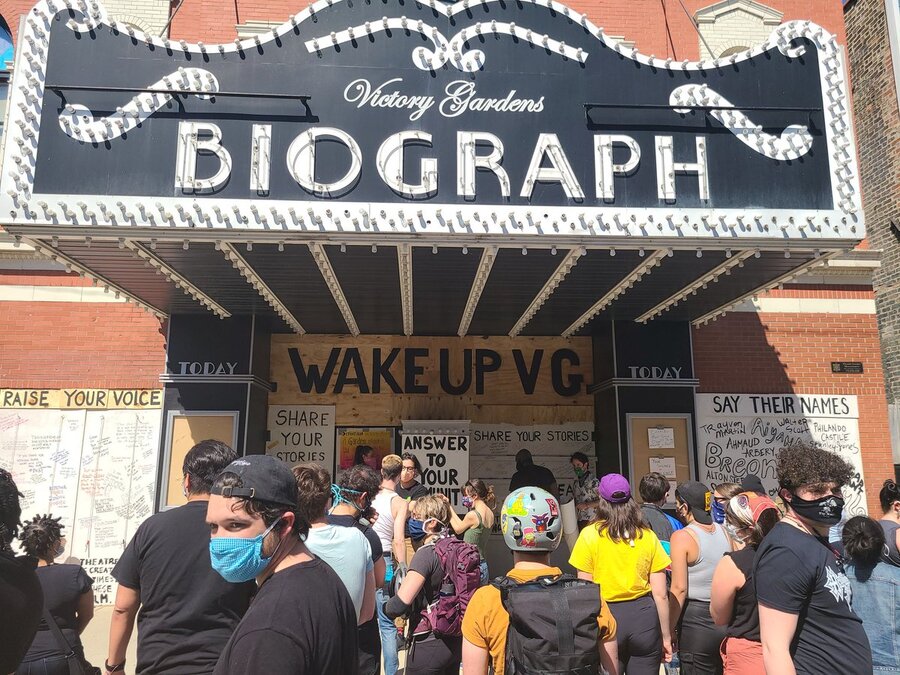
PIERCE: Last summer, the community expressed frustration that VG’s actions weren’t aligned with its mission. How do you start to mend that bridge with the artists in the community, and does it feel like the steps you’re taking are starting to do that?
CHARLES E. HARRIS II: I certainly hope so. As far as last summer: I, as well as the other board members, have been introspective about what we did wrong in the process and what we could have done better. Actually, I prepared for this interview and I saw something that you wrote, which I think is so true. You said, “[Under Chay Yew’s guidance] Victory Gardens has continuously lifted the voices of women, POC, and folks from other marginalized communities.” I think that’s true. So understanding that that has been our mission and that been our focus for the number of years, what did we do wrong? Why did we have that reaction? So I looked back at our mission statement, and it talks about theatre experience that belongs to everyone. Theatre is really unique in that you have so many stakeholders. I think we forgot about the “everyone” part of the mission and making sure that everyone is heard.
MARTIN: First things first, I don’t presume that I will never make a mistake. I don’t presume that I will be completely infallible. But I’m making a renewed commitment to living by my values, which I think are aligned with the values of this theatre and the mission.
To your question about how do you go about doing that: I had to sit and listen. I think that’s what the most important thing is and what I’ve committed myself to. I want to go on a very aggressive and ambitious listening tour, where I want to literally have one-on-one conversations or small group conversations with as many artists—past, present, hopefully future—that are affiliated with this institution or have been affiliated with this institution and want to be affiliated with this institution.
I’m doing the same with the staff. I’m doing the same with the board. I’m doing the same with all other parties. I even, just this morning, spent a little bit of time trying to make sure that some of the resident artists and people that were already in the mix that I already knew and have personal relationships with heard this news directly from me, now that we’re closer to the announcement, and they’re not finding out in some press release.
That’s the transparency and genuine open-hearted listening that I’m excited to be able to do. I also have said very candidly and frankly throughout the interview process: I don’t expect anyone, artists or otherwise, to give me the benefit of the doubt in this situation. I hope that people understand that just because I am now the artistic leader of this institution, that doesn’t mean that anti-Blackness all of a sudden doesn’t exist any longer, or that my Black face as a representative means that all of a sudden VG is absolved of any prior harms that it might have done.
So I say all that to say that I still want to get a deeper understanding of where the issues really lie and how we can best address them for the future. I was very candid in the interview process in talking about wanting to also work quickly to support the work that the staff has already begun around a response to We See You, White American Theatre and building out an anti-racism and equity and inclusion action plan. I’m excited to build upon their work and push it even further based on my experience and what I know.
Jerald Raymond Pierce (he/him) is associate editor of American Theatre. jpierce@tcg.org

